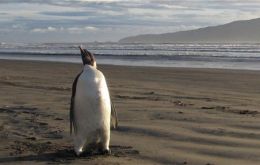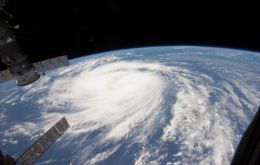MercoPress. South Atlantic News Agency
Environment
-
Friday, September 16th 2011 - 15:59 UTC
UK wants to end £ 12bn throw-away of edibles, issues new label dates guidance

The British government has issued new guidance for the food industry on the use of food label dates amid growing concerns at the amount of food that is wasted each year by UK households.
-
Thursday, September 15th 2011 - 07:16 UTC
Brazil mourns death of creator of the controversial ‘bio-diesel’

Brazilian scientist Expedito Jose de Sá Parent, 70, who is considered the creator of bio-diesel died this week in Fortaleza. President Dilma Rousseff paid tribute to the researcher who developed the ‘green’ fuel from oilseeds.
-
Tuesday, September 13th 2011 - 05:16 UTC
BPU Meat Uruguay responds to UK Hereford beef labelling controversy

On September 10th MercoPress reproduced a piece from Meat Trade News Daily (UK farmers claim Uruguay’s ‘Hereford’ meat labelling is ‘misleading’) in which the UK National Farmers Union, NFU called on Asda supermarkets to change its labelling policy after it emerged that its meat marked ‘Hereford Prime Beef Sirloin Steak’ is sourced 6,800 miles away in Uruguay.
-
Saturday, September 10th 2011 - 06:29 UTC
Uruguay offered cheaper power from private wind-farm developers

Uruguay could enjoy 1.3 billion dollars of wind farms in the next four years after developers said they could provide electricity cheaper than conventional energy sources.
-
Tuesday, September 6th 2011 - 11:09 UTC
‘Happy Feet’, the penguin beached in NZ released to return to Antarctica

‘Happy Feet’, the lost Emperor penguin who became a worldwide celebrity after he washed up on a New Zealand beach was released back into the Southern Ocean on Sunday to begin a long swim home to Antarctica.
-
Monday, September 5th 2011 - 02:02 UTC
Hurricane Katia intensifies and moves closer to the US east coast

Hurricane Katia continued to intensify Sunday afternoon as it churned in the Atlantic Ocean, spurring warnings about rip currents and fears it could soon develop into a “major hurricane,” the United States National Hurricane Center said.
-
Wednesday, August 31st 2011 - 08:34 UTC
Global production of bio-fuels increased 17% last year reaching 105 billion litres

Global production of bio-fuels increased 17% in 2010 to reach an all-time high of 105 billion liters, up from 90 billion liters in 2009.
-
Tuesday, August 30th 2011 - 03:53 UTC
Uruguay plan to regularize 676 shanty towns (200.000 people), most in Montevideo

Uruguay announced it will invest 150 million dollars for the eradication of shanty towns, 90% of which are located in Montevideo, half of them in contaminated and flood-prone areas.
-
Tuesday, August 30th 2011 - 03:47 UTC
New York City recovering from Irene, but Vermont ravaged by flood waters

Although hurricane Irene crossed into Canada overnight Sunday but wasn't yet through with the United States, where flood waters in Vermont caused the greatest damage in 75 years and in New York state big city commuters had to make do with slowly reawakening transit systems.
-
Sunday, August 28th 2011 - 09:31 UTC
Hurricane Irene blasts New York

Hurricane Irene tore Sunday into New York, hammering Manhattan's skyscrapers with fierce winds and threatening to flood the financial district after killing at least nine people along the US east coast.
